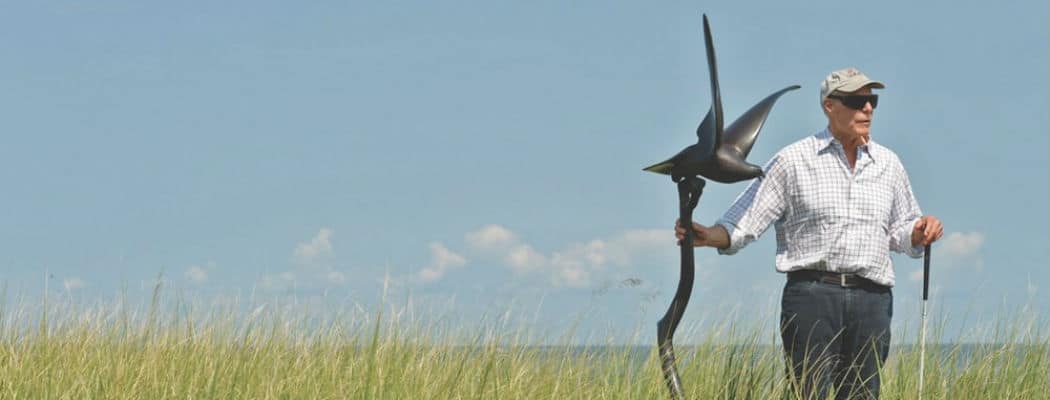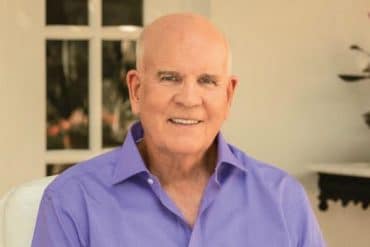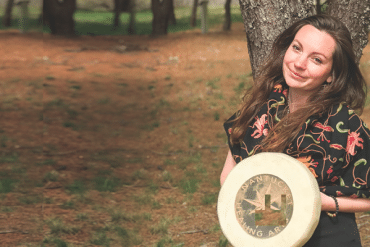Summer resident Gordon Gund illuminates the Film Festival this June in a documentary by The Nantucket Project.
 A man does not always need eyes to see, or sight to have vision. At the age of thirty, Nantucket summer resident Gordon Gund was rendered completely blind by a degenerative eye disease called retinitis pigmentosa. This loss would have derailed most, but Gund’s condition actually set him on a course of discovery that is now having profound effects in the fight to cure blindness. The story of Gordon Gund, which is powerfully told in an award-winning film by The Nantucket Project screening at the Nantucket Film Festival this month, not only illustrates how a person learned to live with adversity, but also how he turned weakness into a strength that’s now changing the future of mankind.
A man does not always need eyes to see, or sight to have vision. At the age of thirty, Nantucket summer resident Gordon Gund was rendered completely blind by a degenerative eye disease called retinitis pigmentosa. This loss would have derailed most, but Gund’s condition actually set him on a course of discovery that is now having profound effects in the fight to cure blindness. The story of Gordon Gund, which is powerfully told in an award-winning film by The Nantucket Project screening at the Nantucket Film Festival this month, not only illustrates how a person learned to live with adversity, but also how he turned weakness into a strength that’s now changing the future of mankind.
“I think that everybody has a lot more capacity in all of their senses than we use,” says Gund, now seventy-seven. “Sight is probably the one we use the most — it’s a very visual world. But we have much more capacity to listen in different dimensions.” With his wife Lulie of fifty-one years by his side, Gund has turned his other senses into superpowers that have propelled him to astounding heights as a businessman, sports team owner, philanthropist, and artist. “Gordon is so determined,” Lulie Gund says. “It’s not like you have to push him — if anything you have to hold him down.”
Determination runs deep in Gund’s family. When Prohibition shut down his father’s family brewery, Gund’s father purchased a coffee company that he later sold to Kellogg’s for $10 million in stock. After a number of savvy investments during the Great Depression, George Gund II eventually became the director of the Cleveland Trust Company and turned it into the largest bank in Ohio. He and his wife, Jessica, had six children, and, despite their growing fortune, they raised them to be self-reliant and carve out their own course in life. That was especially the case for their middle son, Gordon.
 Gund studied at Harvard before entering the Navy, where he served as an officer on two destroyers in the Pacific. After his service in the Navy, he went into banking and began amassing his own career accomplishments in corporate finance. He learned how to fly a plane and navigated his own private jet up and down the East Coast. With a beautiful wife and two healthy children, Gund’s life seemed set. But in the 1960s, his sight began to fail. First he started losing his peripheral vision, then his ability to see at night. An optometrist diagnosed him with retinitis pigmentosa, a degenerative eye disease that usually claims people’s vision in their sixties. Gund had a particularly aggressive case, and by the age of thirty, he was completely blind.
Gund studied at Harvard before entering the Navy, where he served as an officer on two destroyers in the Pacific. After his service in the Navy, he went into banking and began amassing his own career accomplishments in corporate finance. He learned how to fly a plane and navigated his own private jet up and down the East Coast. With a beautiful wife and two healthy children, Gund’s life seemed set. But in the 1960s, his sight began to fail. First he started losing his peripheral vision, then his ability to see at night. An optometrist diagnosed him with retinitis pigmentosa, a degenerative eye disease that usually claims people’s vision in their sixties. Gund had a particularly aggressive case, and by the age of thirty, he was completely blind.
Yet instead of succumbing to his handicap, Gordon and Lulie Gund committed themselves to finding a cure. “We were naive,” says Gund. “The US had just put a man on the moon eighteen months before, so we thought it would take five to ten years to have the answers. Well it doesn’t work that way.”
A year after he went blind, the Gunds founded the Retinitis Pigmentosa Foundation, what is today the Foundation Fighting Blindness. “It was like working with a blank canvas at the time,” says Gund. “We had to build up the knowledge base about the retina, about this family of diseases, and of the visual process. It was a monumental job.”
Gund became fluent in the complex medical language of blindness, a feat made all the more astounding by the fact that he relied on the material being read to him. Finding braille too slow and tedious, he taped conversations and meetings and played them at high-speed over and over to commit the information to memory. “If I go to a board meeting, I can’t just look at a piece of paper in front of me and follow along,” Gund says. “I have to gather that info ahead of time, lock it in, and think about it so it’s not just words or numbers, but that I really understand it.” In time, Gund’s memory multiplied in capacity.
 Meanwhile his blindness seemed to pour gasoline on the fire of his life, and he began to flourish in unexpected arenas. Gund took up skiing and braved steep slopes with an aid calling out each turn and obstacle. After a friend on Nantucket introduced him to wood carving, he dove headlong into sculpture. Today his towering bronze pieces not only dot his lawn on Nantucket, but they have been exhibited in museums and galleries around the country. Stripped of visual distraction and tuned into the nuances of each negotiation, Gund thrived as a businessman. Along with serving as a director of the Kellogg Company and Corning, Gund’s investment group amassed a portfolio that includes vast real estate holdings, advertising agencies, and ingenious medical innovations such as Invisalign. In partnership with his brother, George, Gund bought and sold three sports teams, including the Cleveland Cavaliers during the first Lebron James era. In 2016, Gund helped hoist a title banner in the arena formerly named after his family and with it raised up the entire city of Cleveland.
Meanwhile his blindness seemed to pour gasoline on the fire of his life, and he began to flourish in unexpected arenas. Gund took up skiing and braved steep slopes with an aid calling out each turn and obstacle. After a friend on Nantucket introduced him to wood carving, he dove headlong into sculpture. Today his towering bronze pieces not only dot his lawn on Nantucket, but they have been exhibited in museums and galleries around the country. Stripped of visual distraction and tuned into the nuances of each negotiation, Gund thrived as a businessman. Along with serving as a director of the Kellogg Company and Corning, Gund’s investment group amassed a portfolio that includes vast real estate holdings, advertising agencies, and ingenious medical innovations such as Invisalign. In partnership with his brother, George, Gund bought and sold three sports teams, including the Cleveland Cavaliers during the first Lebron James era. In 2016, Gund helped hoist a title banner in the arena formerly named after his family and with it raised up the entire city of Cleveland.
But Gund’s crowning achievements still appear to be on the immediate horizon. After forty-six years of painstaking fundraising, intense research, and exhaustive trials, the Gunds’ foundation is finally finding cures to the kind of diseases that robbed him of his sight. Nine years ago, an eight-year-old boy from Belgium named Yannick Duwe became the first person to have his sight restored through a form of gene therapy backed by Gund and his foundation. “Now there are more than a hundred children and young adults who have been through that clinical trial and all of whom have had significant amounts of sight restored,” Gund says.
The gene therapy has since been submitted for FDA approval. “If it’s approved — and we have every expectation that it will — it will be the very first gene therapy ever approved by the FDA for any genetic disease in the United States,” Gund explains. This watershed approval could then open the doors for other genetic therapies that treat a host of diseases beyond those that cause blindness.
 This triumph is one the many powerful stories captured in The Illumination, an award-winning short film about Gordon and Lulie Gund created by The Nantucket Project. The eighteen-minute film debuted at last year’s Nantucket Project and has since won audience choice awards at both the Cleveland International Film Festival and San Francisco International Film Festival. This June, The Illumination will be screened as part of the Nantucket Film Festival, and the Gunds will be in attendance. “The movie shows that if you’re blind, it’s not the end of the line,” says Lulie. “There’s a lot you can do.”
This triumph is one the many powerful stories captured in The Illumination, an award-winning short film about Gordon and Lulie Gund created by The Nantucket Project. The eighteen-minute film debuted at last year’s Nantucket Project and has since won audience choice awards at both the Cleveland International Film Festival and San Francisco International Film Festival. This June, The Illumination will be screened as part of the Nantucket Film Festival, and the Gunds will be in attendance. “The movie shows that if you’re blind, it’s not the end of the line,” says Lulie. “There’s a lot you can do.”
The Illumination also captures the heartwarming relationship between Gordon and Lulie Gund. “I wouldn’t have done anything like what I have without Lulie,” Gund says of his wife. “It’s hard for me to think of how it would be without her, because fortunately that has not been the case.” But Lulie insists that her husband would have achieved the same heights without her, only “doing it together made it much more fun than onerous.”
Of the ten million people living with diseases such as retinitis pigmentosa in the United States, Gund himself will never regain his vision. His condition is too far gone. But in his mind’s eye, he sees a future where no one else will carry the burden he has for the last forty-seven years. Indeed, he and Lulie have set a legacy in place that will continue to illuminate eyes and minds for generations to come.
The Illumination will be screening on Friday, June 23rd at 4:45 P.M. at the Dreamland Main Theater as part of the Nantucket Film Festival. A question and answer session with Gordon and Lulie Gund will follow. For tickets and more information, click here.






